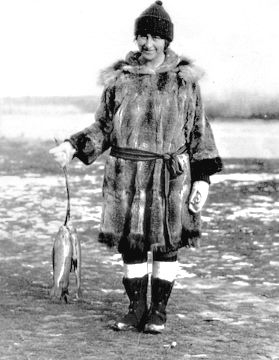Cornell Environmental Film Festival 2000 explores humanity's role in natural world Oct. 13-19
By Roger Segelken

Seventeen cinematic works and the filmmakers behind them will explore humanity's role in the natural world during the Cornell Environmental Film Festival 2000, scheduled for Oct. 13-19 at Cornell University.
Topics of the festival, which is presented each year by the Cornell Center for the Environment, include sustainable architecture, a culture threatened by desertification, citizens' role in watershed preservation, a river that survived pollution, strategies to counteract suburban sprawl and a 97-year-old environmental hero.
"Film has become a medium not only for entertainment but also for expressing opinions, documenting evidence and visually representing critical issues, and a sizeable collection of cinematic work now is focused on the environment," explained festival coordinator Christopher Riley. "This year we have selected some of the best in an attempt to expand the viewer's notion of an environmental film, stimulate the intellect and provoke discussion."
All screenings and discussion sessions are open to the public, including the Ithaca premiere of a documentary by local filmmakers, and most are free of charge. Co-sponsors of the Environmental Film Festival are Cornell Cinema and the Einaudi Center for International Studies, with support of other units at Cornell University as well as Ithaca College and Syracuse University, where additional showings of some films are scheduled.

Included in the Cornell Environmental Film Festival 2000 are the following:
- "The Last Rivermen" and "The Hudson Riverkeepers," Friday, Oct. 13, at 7:15 p.m. in Willard Straight Theatre. Two films about the fall and rise of the Hudson River and the people behind its transformation with commentary by John Cronin, filmmaker and former Hudson Riverkeeper. Tickets are $4.50 ($4 for students, seniors and children under 12). o "Environmental Animation Festival!" Saturday, Oct. 14, at 2:30 p.m. in Willard Straight Theatre. Children's author Michael Demunn hosts a program of animated short films, recommended for ages 6 and up, including "The Sandbox," "Dinner for Two" and Nick Hilligos' "Turtle World."
- "The Secret Life of Cats," Saturday, Oct. 14, at 4:30 p.m. in Willard Straight Theatre. An intimate look at felines, their feral cousins and the soul of a killer that lurks within.
- "The Architecture of Mud," Saturday, Oct. 14, at 7:15 p.m. in Willard Straight Theatre, followed by discussion with filmmaker Caterina Borelli and collaborator Pamela Jerome. Sophisticated vernacular construction techniques of Yemen. Admission is $4.50 ($4 for students, seniors and children 12 and under.
- "River of Sand," Sunday, Oct. 15, at 4:30 p.m. in Willard Straight Theatre and Monday, Oct. 16, at 4:15 p.m. at Ithaca College's Whalen Center for Music. Filmmaker Robert Lang and musician Bruce Cockburn travel to Mali for a personal and musical look at a people fighting to hold back the desert.
- "The Witness," Sunday, Oct. 15, at 7:30 p.m. in Uris Auditorium. The Ithaca premiere for local filmmakers Jenny Stein and James LaVeck with the story of animal-phobic Eddie who fell in love with a kitten, rescued abandoned animals and became a leading street-level educator.
- "Thinking Like a Watershed," Monday, Oct. 16, at 4:30 p.m. in Willard Straight Theatre, with discussion by Greg Nagel, Department of Natural Resources. Citizens restore the ecological health of California's Mattole River valley and its salmon population.
-
 A scene from "The Witness."
A scene from "The Witness.""Subdivide and Conquer: A Modern Midwestern," Monday, Oct. 16, at 7:30 p.m. in Hollis E. Cornell Auditorium, Goldwin Smith Hall at Cornell, with discussion by producer Chelsea Congdon, Charles Geisler of Rural Sociology and others; also Sunday, Oct. 15 at 4 p.m. in Ithaca College's Park Auditorium with discussion by Congdon. How public policy and thoughtful land-use plans might counter suburban sprawl.
- "The Cow Jumped Over the Moon," Tuesday, Oct. 17, at 4:30 p.m. in Willard Straight Theatre, followed by a panel discussion. Space-age technology helps Fulani nomads of West Africa and their cattle survive drought.
- "Arctic Dance: The Mardy Murie Story," Tuesday, Oct. 17, at 7:30 p.m. in Goldwin Smith Auditorium D, with discussion by filmmaker Bonnie Kreps. A 1924 honeymoon by dog sled through the Alaskan wilderness, and how Margaret Murie, now 97, became "The Mother of the American Conservation Movement." o "Maharajah Burger," Wednesday, Oct. 18, at 4:30 p.m. in Willard Straight Theatre with discussion by Anke Wessels, director of CRESP; also Tuesday, Oct. 17, at 7 p.m. in Ithaca College's Textor Hall and Thursday, Oct. 19, at 4 p.m. at Syracuse University's Maxwell Auditorium. Hospices for ailing cows, franchise restaurants and cultural confrontation in India.
- "The Charcoal People," Wednesday, Oct. 18, at 8:00 p.m. in Uris Auditorium, with filmmaker Nigel Noble. Impact on the lives and life expectancy of 60,000 laborers who cut down forests to make charcoal for the multinational pig-iron industry,
- "The Gift," Thursday, Oct. 19, at 4:30 p.m. in Willard Straight Theatre, with discussion by Jane Mt. Pleasant, Cornell American Indian Program; also Tuesday, Oct. 17, at 1 p.m. in Room 104 of Syracuse University's Hall of Languages, with discussion by Ann Grodzins Gold. An exploration through interviews, dance and song of the intertwined lives of corn, the sacred plant, and indigenous peoples of the Americas.
- "Silent Sentinels," Thursday, Oct. 19, at 7:30 p.m. in Hollis E. Cornell Auditorium, Goldwin Smith Hall, followed by a panel discussion. Documentary investigates the mass bleaching of coral reefs and invesigates possible connections to global warming.
Media Contact
Get Cornell news delivered right to your inbox.
Subscribe